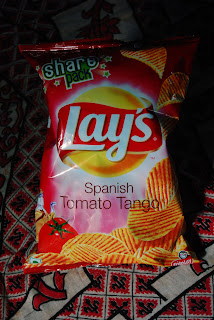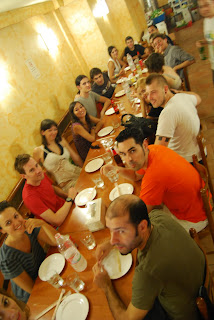Uno de los cientos de grupos que nos encontramos en la carretera. One of the more of hundreds of groups we ran into on the road.
Jitu y yo en el Ganges, Rikaresh. No somos novios, darse la mano es costumbre india entre amigos. Jitu and me in the Ganges, Rikaresh. He's not my boyfriend, it's very indian for friends to hold their hand together.
Visten de naranja, tienen aproximadamente de 15 a 30 años, son varones y muy religiosos. Salen de –generalmente- sus pueblos para un viaje religioso hasta alguna ciudad santa por donde pase el Ganges, como Haridwar y Rishikesh. Allí recogerán agua del río sagrado, que purifica y da suerte, y se la llevarán a sus pueblos. Se mueven en grupos de unos 5 a 20 personas. Pueden ser violentos, no dudan en pelear incluso entre grupos. Invaden las carreteras y saben que están en su derecho, no hay que molestarles. Avanzan entre cánticos marciales, que se oyen desde lejos, donde una voz grita y los demás contestan. Realizan aquí y allá el rito del Bong Bambolé: fumar marihuana en pipa por y para Shiva, lo cual les da fuerzas para continuar. La marihuana es ilegal en India salvo en ciudades santas durante ciertos ritos religiosos como lo es este. El 8 de Agosto es su día más grande, para entonces habrán cerrado ciertas carreteras por la inundación de chicos de naranja.
Hablamos con Jitu en Rishikesh a las orillas del Ganges. Buen chico, estaba esperando a una española que se bañaba a esas horas. Se desilusionó un poco cuando le dije que no venía desde España a estar en el Ganges sino a viajar por India. Juti camina día y noche, aunque las noches no cunden tanto.
They wear orange clothes, aged around 15 to 30 yo, males and very religious. They come from their –generally- town for a pilgrimage to some holy city where the Ganges passes through, like Haridwar or Rishikesh. Over there they will take some water from the holy river, which purifies and gives good luck, and they will carry it back home. They walk in groups of around 5 to 20 persons. They can be violent and they don’t hesitate to fight even between different groups. They invade the roads and they know they have the right to, it’s better to not disturb them. They march on amongst martial chants which can be heard from far away, in which one voice shouts and the rest of them aswer. From time to time they do the Bong Bambole ritual: smoking marihuana in pipes for Shiva, so they strength s restored for keeping on. Marihuana is illegal in India but not in holy cities during religious ritual. The 8th of august is their big day, few days before some roads will be closed because of the orange guys flooding.
We talked with Jitu in Rishakesh at the Ganges shore. Nice lad, he was waiting for a Spanish girl who should be having a bath at the time. He was slightly disaponted when I told him that I didn’t came because of the Ganges but just to visit India. Juti walks day and night, though during nights he's not advancing that much.
























